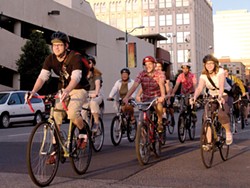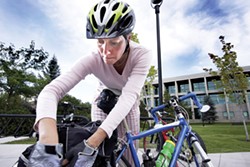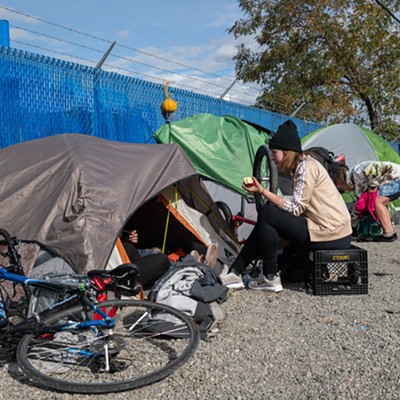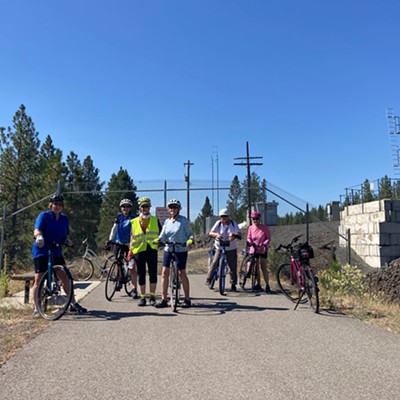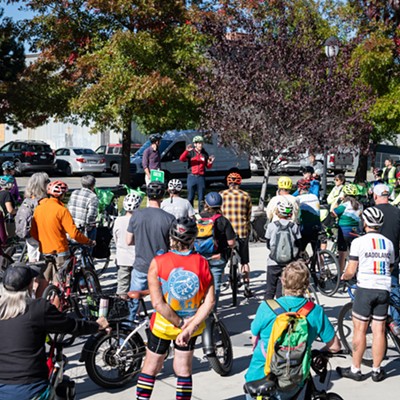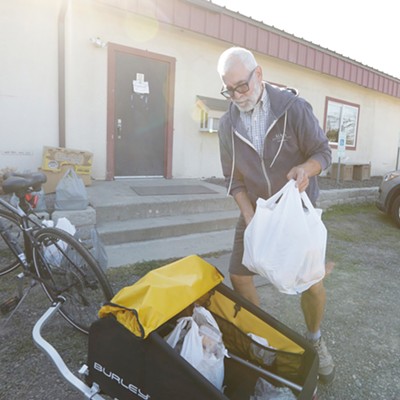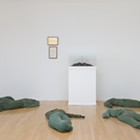Jake McBurns was surprised to see so many people outside the Elk Public House in Browne's Addition at midnight on a recent Saturday. "Is it still open?" he wondered to himself, as he pulled up on his bike.
Nope.
The dozen people standing around the Elk's patio were fellow cyclists on a mission. In a few minutes, they'd embark on the second annual Midnight Century ride -- a brutal, nocturnal and totally informal bike ride mapped out and led by Latah Bistro chef David Blaine, who recently rode in the Great Divide bicycle race from Canada to Mexico.
The route would take them along the Centennial Trail to the Idaho state line, where a quarter of their party would peel away and head home. "Now the ride begins," Blaine would say over his shoulder. From there they'd leave the streets for dirt roads and punishing climbs through pitch-black woods. One rider with a busted drive train would do this all on his toughest gear.
At 3 am, somewhere near the Saltese Flats, they'd encounter a solitary cyclist on his way home from work, who would watch them screaming through the dark and utter, "What the hell?" By sunrise, even Blaine would have crapped out. By 8, McBurns would make it back to Browne's Addition, where he'd order three portions of hashbrowns and coffee for himself and the only other two finalists, who would wobble into the diner about half an hour later.
Insane, yes. But it's nothing unusual in Spokane these days.
Out of the Shadows
Two years ago, The Inlander published a cover story assessing the state of cycling culture in Spokane — a city that, while nominally outdoorsy and eminently ride-able, seemed to lack a vibrant bike scene. What we found was surprising. Though most people wouldn't know it from the scarcity of cyclists on the streets (and the absence of indicators like bike lanes, racks and signs), Spokane had a small but passionate community of bike enthusiasts.
People like Joe Perrizo, a 22-year-old bike mechanic at Wheelsport who was on his way to becoming one of the nation's best dirt bikers. Or Eileen Hyatt, a Spokane Bicycle Club ride-leader and one of the city's most knowledgeable bike advocates.
Everywhere we looked, we found people waking up before dawn to go on grueling long-distance rides, or building mountain bike trails in the woods, or racing in time trials, or trying to organize unlicensed competitions.
But you had to look to find them. Because while these subsets of devoted bike nuts were out there, that passion for the bicycle had yet to trickle out to the streets and into everyday public life. Spotting a cyclist riding to work, going to fetch groceries, or heading out to the bars was somewhat rare. People like Hyatt pointed to a historical lack of leadership from the city and a failure to safely accommodate people who wanted to travel Spokane by bicycle. And even some die-hards said that while they loved nothing more than taking jumps in the woods on their mountain unicycles, they weren't about to go wheel-to-wheel against Spokane motorists. There was no sign of the kind of bike culture that helps make cities like Portland and Seattle so vibrant. And the city of Spokane was doing little about it.
Two years later, everything has changed.
Wheels Up
I've recently come into possession of a battered but elegant 1960s Japanese road bike. It's a beast of a thing, heavy and rattling. But it has a certain flair, with a retro decal, metal fenders, a luggage rack and an old-fashioned horn mounted to the bar-end. With a little care and a few modern amenities, I figured, it would make an ideal cruise-around-town bike.
So, on a recent drizzly Monday evening, I took it to the Pedals2People garage. Here, in a small, donated backyard space a couple of blocks from the Rocket Market on the South Hill, the nonprofit Pedals2People refurbishes old bikes and guides newbies in the art of building a beater from the wheels up. The group, which is awaiting approval for 501(c)3 status, was born of a desire to get more bikes onto Spokane's streets, says Liza Mattana, an REI bike mechanic and the president of Pedals2People.
"When we moved back [to Spokane four years ago]," she says of her family, "there wasn't a lot going on, so we thought, 'Well, let's just start something. Let's take our time and get some people together and see what happens.'"
A small group of stakeholders began meeting in January 2007 to decide Pedals2People's structure. "Did we want to do advocacy? Did we want to do education? Did we want to do a retail space?" Mattana recalls the group wondering. "We decided we don't want to compete with the bike shops that are in town. We don't want to sell new bikes and new parts. We want to be a sustainable business and sell used or recycled parts. There's so much life left in a bike."
On this particular evening, Kelly Hammer, 20, is milking extra life out of an ivory-colored 1960s Olympic road bike. He explains that the week before, a drunk driver destroyed his old bike when he plowed into it on the front rack of an STA bus. "It's been killing me," he says, as he painstakingly applies lube to each link of the Olympic. "I don't drive anywhere, [and biking] is so much more fun than riding the bus. And way faster."
Hammer first heard about Pedals2People from participants at a Critical Mass ride -- the monthly group ride/political statement in which cyclists amass in the streets during Friday rush-hour traffic to assert their rights to the road. He showed up at the South Hill garage one night and was instructed to strip a bike to the ground — "which is, like, the best thing for a new person to do, because you're just destroying it essentially" — and now he's a regular volunteer.
Inside the cramped shop, it's a bike gleaner's heaven. Forks and tires hang from the rafters. The walls are covered in tools, old chains, water bottle cages, bikes for sale, bikes for repair. Plastic bins full of cranks, shifters and cantilever brakes sit in stacks around the floor. In one corner, a '50s-era refrigerator holds boxes of pedals and calipers. On the floor in the opposite corner is a gnarled whorl of denuded bicycles.
Retired Air Force pilot Bernard Jones is adding to that pile. Jones first heard about the shop from an article in Out There Monthly about the group's connection to the Village Bicycle Project, a nationwide effort to intercept landfill-bound bikes and ship them to Africa, for use as transportation. "That's what I was interested in: how they're shipping them overseas," he says. Jones started showing up at the shop in March and has come back nearly every week since then. "Let me go to sleep now," he says, wandering away down the darkened alley, "and I'll come back Wednesday."
Hovering around the shop is a group of core volunteers. Tonight, they helped a guy named Eric, who is part of their Build-a-Beater program — a flat $50 allows you to select a frame, pick through the parts and build yourself a bike one piece at a time. Pedals2People also sells some bikes, rents out shop space and provides basic bike maintenance training for $20.
But their most successful offerings, says Mattana, have been the free tune-ups provided at community gatherings like the South Perry and Garland street fairs. "We really liked getting out there, and it was a really big bang for our buck. Really close contact with people, seeing the bikes, seeing how happy they were to get them running," she says. "It just makes me happy. I'm like a librarian that sees kids reading Harry Potter books."
Full-Moon Fiascos
The Pedals2People shop has become an unofficial capital of Spokane's growing bike community. Among its regular volunteers and closest friends are popular bike bloggers and advocates, and cycle-friendly media folks. Helping to close the shop tonight is Jeff Everett, 36, a recent transplant from Mississippi, by way of Missouri. Everett is responsible for a year-old phenomenon that is one of the surest pieces of evidence that Spokane has finally developed an urban bike culture.
It started in St. Louis, where Everett was living with his wife, Lisa, while she went to school for physical therapy. "There was a guy that just came up with the idea with six other people and said, 'We need to start a f---ing bike club.' They needed a name, and another guy said, 'Well, it has named itself,'" Everett recalls. The guiding principle of the F---ing Bike Club (FBC) was "don't be an asshole," and the agenda was simple: Meet every month on the night of the full moon and ride your bike to a couple of bars. There were no club jerseys or membership dues. The only accoutrements were a series of collectible spoke cards handed out at each ride.
The club picked up steam in St. Louis, and when the Everetts moved to Spokane last July, Jeff decided to start a chapter here. The first "Full Moon Fiasco" put on by the local FBC was sparsely attended. "Counting me and my wife, there were two people," Everett remembers.
Since then, however, the popularity has grown -- through word of mouth and Everett's blog (fbcspokane.blogspot.com). When the FBC threw a special non-full-moon, prom-themed event in late May, it drew some 40 participants in formal attire, who paraded through downtown Spokane and ended up at the Baby Bar, where a DJ and prom decorations were waiting. "[That was] when I realized it had started to grow by itself," Everett says.
It has continued to grow. The June ride began at Bennidito's pizza, crowding the restaurant with customers and littering the sidewalk and parking lot with bikes of every stripe. July's one-year anniversary ride attracted another 40 people. In August, an astounding 72 people showed up for a slow, casual ride from the Swamp across the empty Maple Street Bridge to the Hub tavern. "I made sure to tell everybody before we went in: Be super-patient with them because it was just the one chick working the bar. [She had this] doe-eyed look. Like, 'Aww, shit,'" he says. By night's end, though, the bartender told him she made more tip money than she would have in two weeks.
Next month's ride across downtown through the University District to Gonzaga will have a back-to-school theme ("Trapper Keepers optional," says Everett). That takes place Monday, Sept. 15.
But for all the success of his club, Everett doesn't come across as a figurehead, and he's careful to explain that the FBC isn't a cause or a crusade. "I've had it confused with Critical Mass since I've moved here. That's not what it's about. I'm not trying to make a political statement or assert my bicycle into traffic other than in the usual ways," he says. "I usually try to keep the route to the side streets, the Trail. We'll keep it to one lane and use our hand signals and be polite, and the cars do the same."
Still, Everett isn't entirely unaware of the significance of the FBC phenomenon. "It does say something — [that] there's enough kids out there who want to ride their bikes ... without making a statement about it."
Writing Bikes
Notably absent from the Pedals2People shop during our visit was John Speare. The husband of Liza Mattana, Speare was one of the founders of the nonprofit. Today, he's one of the most unifying and important voices in the local bike community as the author of both Out There Monthly's "Everyday Cyclist" column and the Cycling Spokane blog (cyclingspokane.blogspot.com), which he began in November 2006. He is also a member of Spokane's city-appointed Bicycle Advisory Board.
Speare's OTM column is appropriately titled. While he's an inveterate bike nut who rides like an animal (he was one of the other two finishers of the Midnight Century ride), he's not a racer, mechanic, messenger or any form of bike snob ("God help me if I ever ... wear Spandex," he wrote on his blog earlier this year). He's a 37-year-old father of one and a technical writer for Microsoft who happens to have an obsession.
"I just like riding bikes," he says. "I guess if I was into drag racing, I'd be the same way with drag racing."
Though obsessive, Speare is also exceedingly pragmatic and has often focused his columns on the nuts and bolts of commuting, the joys of stuffing as much crap on a bike rack as you possibly can and the importance of selecting a bike that is comfortable and practical rather than popular and ill-fitting. ("The hype around bikes is so misguided," he says.)
Although David Blaine wrote about bikes on his blog before Cycling Spokane ever launched, Speare's blog was the first to make bikes its exclusive focus. It's not the last, however, as Cycling Spokane begat 100km.us, a bike blog by 34-year-old Gonzaga computer tech support Jason Gilman, who was inspired by Speare's blog to re-enter the world of bike commuting.
Gilman's and Speare's aren't even the only blogs that treat bike issues, though. Blaine has discontinued his old Great Divide-centric blog and opened a new one, Double-Butted Spokane. Blogs like Fresh Abundance, Elephant Pilot Messengers, FBC Spokane and 26InchSlicks also regularly discuss cycling. Even MetroSpokane, the must-read blog on development and urban issues in Spokane, has begun to concern itself more with bikes as a progressive means of transportation and entertainment in Spokane.
Two years ago, such bike chatter didn't exist.
"I think people are starting to assume that [cycling] is one of the things that happens here," says Barb Chamberlain, a spokeswoman for Washington State University Spokane. "It's good to have it as a default setting."
The 45-year-old former Idaho state legislator last year married a rider from Spokane's Rocket Velo racing team. This year, she organized possibly the most forceful show of bike culture Spokane has ever seen.
Taking It To The Streets
"It took off," says Chamberlain.
When she and a small group of interested stakeholders first sat down to discuss putting on a local event for national Bike to Work Week in May, they estimated that they'd get about 300 people to take part. Such an event hadn't been put on in Spokane in decades, but Chamberlain and the rest started hitting bike shops and tapping e-mail lists to spread the word and gauge interest. "There was no history to go back to. We kind of picked a number and said if 300 people registered, that would feel pretty good," Chamberlain says.
They were aiming for three different demographics, she says: "Cyclists who don't bike commute, people who used to bike but don't anymore, and people who live within three miles of downtown." They also worked with Spokane schools to encourage students to walk or bike to work (and parents to bike their kids to school, then bike to work).
By May 5, 600 people had registered. By the official May 12 kick-off of Bike to Work Week, which included a pancake breakfast in Riverfront Park, 952 people had registered. Aside from average commuters, Mayor Mary Verner and City Councilmen Richard Rush and Michael Allen also rode to work, as did state Senators Lisa Brown and Chris Marr. At the concluding ceremony that Friday, hundreds of cyclists piled into the plaza at Steam Plant Square for an elaborate awards ceremony. When they left, the streets of Spokane ran bright green with the free T-shirts given to participants.
"At the breakfast a woman came up to me and said 'Thank you for doing this. On my route to work, I usually don't see anybody,'" Chamberlain recalls. "Some people started for the first time because of the promotion. One response was: 'I bike-commute anyway, but this was important because it gave me a chance to be recognized.'"
Chamberlain says drivers seem notably more understanding and aware of cyclists these days. "I saw a lot of friendliness during Bike to Work Week," she says. "After that, some guy on a motorcycle honked and waved at me. I was grinding up Grand. He gave me the thumbs up. I don't remember [that kind of] specific positive feedback two years ago that I get now.
"And I see more cyclists, period," she adds. In fact, everyone contacted for this story agreed with that sentiment. At least during the warmer months this year, cyclists have been abundant on the streets of Spokane. And many of them seem not to be hardcore riders in Lycra racing kits but average people in street clothes.
Wheelsport manager Craig Dalzell has taken notice. "We've just come through an interesting year where our numbers are up but instead of selling real high-end carbon fiber road racing bikes or super high-end mountain bikes, we sold a lot more bikes with racks and panniers and fenders," he says. He adds that they carry a set of saddlebags to go over a rear luggage rack -- he used to carry five at a time in the store, and now he keeps 50 in stock just to meet demand.
So, what gives? Why the sudden spike in people riding bikes?
The easy answer is gas prices. "I started here 31 years ago and no matter what president or whatever was happening in the news -- even during the Carter administration -- nobody really freaked out and bought a bike," says Dalzell. "But this year I've personally spoken to hundreds of [people] who were going to buy a bike just because they couldn't swallow $4 gas."
Speare says it's more than that. "I think gas and the environment just bring it to the forefront," he says. "It's also finally becoming cool [to ride a bike] ... We've been so cynical for so long, and at the end of the day, riding a bike is just really f----ing fun."
It's also worth noting that the movement towards bicycles is not exclusive to Spokane. Dalzell notes that the trend at his shop is a national one, and cities across the country report that bike ridership is up. At the professional level, interest in events like the Tour de France has remained steadily high, while this year's Olympics saw the first-ever competition in BMX racing.
If gas prices and environmental consciousness have fed the rise in the number of people biking in Spokane, they'll likely continue to do so. But now that cyclists are flooding the streets, has the city learned to accommodate them?
Pedal Politics
The last time we attended a meeting of the Bicycle Advisory Board — a body made up of community volunteers appointed by the mayor — it felt like a funeral. The board had several vacancies, and the mood was grim. In a half-empty room in the basement of City Hall, several board members discussed how best to put together a simple map of existing bike lanes and preferred routes through the city. But there was an air of futility about the entire proceeding. There was little money available for the project, and the political will to carry it through was practically non-existent.
It's an entirely different board in mid-August, both literally and figuratively. Only one member remains from three years ago, and all but one vacancy has been filled -- by Speare and Chamberlain, among others. They now gather around a large table on the fifth floor of City Hall, near the mayor's office. There's Spandex in the seats, helmets on the table and optimism in the air.
Board chairman Bob Lutz opens the meeting and asks City Planner Ken Pelton for a report on the city's master bike plan. Over the last year, Pelton has been consolidating and updating every bit of bike-related policy in Spokane's Comprehensive Plan. Some of those policies hadn't been looked at in decades, Pelton says. Maps produced by Pelton and others were displayed at a series of three public open houses in April. Attendance at the meetings was "fantastic compared to what we get for other open houses," he says. With the public input, they've assembled a draft plan to present to the city's Plan Commission this month, and then to the City Council by early October. "I don't see that being a huge political fight," says Speare, who arrived late to the meeting -- sweating heavily -- and commenced to patch a blown bike tube at the table. "It would've been [a fight] two years ago."
Next item of business: The city has officially extended an offer to an engineering services professional from Minneapolis, who -- gasp -- seems to be bike-friendly. "She gets it," says Lutz, hinting at a decades-long tension between cyclists (who want to see improved bike lanes and paths) and the city's engineering department (who, cyclists say, concentrate almost exclusively on moving motor vehicles). "That's never happened in City Hall -- getting somebody like that," says Pelton, with a degree of wonderment. "In all my 24 years, that's never happened."
The potential hire of Klara Fabry from Minnesota is good news in itself. But it's nothing compared to the outcome of the Aug. 11 City Council meeting, at which the council unanimously passed a resolution creating a bike and pedestrian coordinator position within the city -- thus bringing Spokane into the ranks of such bike-friendly cities as Portland, Boulder and Madison, Wisc. The position is funded for two years, with money carried over from the 2007 budget. Housed within the public works department, the position will deal exclusively with bike and pedestrian issues, splitting time between public education, coordination of transportation projects, grant writing and reviews of land-use actions.
It's a huge political victory for cyclists in a year that has seen the election of bike-friendly politicians to City Hall and a new dialogue opened over the implementation of bike facilities in projects funded by street bonds. "It goes without saying how excited we are about this," says Lutz, sounding incredulous. "It was a thrilling moment. There was no conversation. It was a 7-0 vote. There wasn't even an opportunity to thank them because they just moved on to the next agenda item."
While others may express surprise at the unanimous vote, City Councilman Richard Rush doesn't. "No, I think it's a very sensible, prudent thing to do, given transportation fuel costs," he says.
He points out one of the city's underlying motives. For the last three years, Spokane has been involved in a national study that threw $100 million of federal money at four communities to fund non-motorized transportation, then analyzed their results. Spokane was the control group against which success in these other four communities was measured. In the next year, the Rails to Trails Conservancy (which engineered the study) plans to ask Congress to double its budget for non-motorized transportation, from $1 billion to $2 billion. With that money, they plan to replicate the original study, this time giving $50 million to 40 different communities.
"The [City] Council got invested in trying to get that money," says Rush. "To get that, you need to be as competitive as you possibly can. A bike-ped coordinator is one of those things you need to have."
Speare and others on the bicycle board credit Rush and Verner for changing the political climate in City Hall and championing issues like bicycle transportation. When a recent project to install new bike racks around the city got hung up in bureaucracy, Speare took it to Rush, he says, and it's moving again.
Bike planning is underway elsewhere, too -- as part of Spokane's Downtown Plan process, inside the Spokane Regional Transportation Council and at the county and state levels.
All the success has the Bicycle Advisory Board thinking big at their monthly meeting. Lutz opens the floor to ideas for possible future projects. Chamberlain suggests a map of bike-friendly eateries, where racks are plentiful and discounts or other incentives are available to those who arrive by bike. Someone else dreams of a free bike giveaway at local colleges, as Ripon College has done in Wisconsin. Another recommends that Spokane look at doing a "ciclovia" -- an idea born in Bogota, Colombia, in which certain downtown streets are completely closed to auto traffic on certain days (in Bogot & aacute;'s case, every Sunday). The ideas keep coming, as the board members busily build a bike-topia in their heads.
"We should be writing this stuff down!" Chamberlain exclaims.
The Next Frontier
Those die-hards we met in 2006 are still going strong. David Blaine is still organizing the occasional unlicensed gonzo ride. Representatives from Spokane's bike-racing community say the scene is better than ever, with more organized teams, racers and spectators. Organizers of rides like the annual Eight Lakes Leg Aches say participation is up. Penny Schwynn of the Fat Tire Trail Riders Club reports that they've made great progress in legitimizing the trail system on Beacon Hill, Spokane's mountain bike Mecca.
But the real story in the last two years has been the quiet but dramatic domestication of the bicycle in Spokane -- its appearance as part of daily life, its use by new and everyday riders. The city still has far to go to make traveling by bicycle safe, easy and convenient. But for the moment, the interest, the economics and the political will are in place to begin that process.
Bill Bender hopes to seize that momentum. The 55-year-old neurologist and founder of "the morning ride" -- an informal group of hardcore riders that has been meeting at 5:45 each morning for the last 18 years -- is the brains behind Spokefest, a community bike ride that will make its debut this weekend. The main event of the festival is a 21-mile ride on a loop from Riverfront Park, out on the Centennial Trail to Seven Mile Road and back. Meanwhile, there will be a bike swap going at the downtown park, where kids will ride their own one-mile course and be entertained with bubbles, unicyclists and music. The first 100 registered children will get complimentary bike flags installed at the park by Wheelsport mechanics. Adult riders will get a free T-shirt at the end of the course and will be treated to a pancake breakfast.
Last week Bender, a kindly man with a voice that's a dead ringer for public radio doctor Zorba Paster's, took me on a tour of the course, which should be familiar to Bloomsday participants and regular cyclists. Riders will begin near the Flour Mill, cross the river, shoot through Peaceful Valley and chug up Riverside Avenue to Government Way, where the course wends through cemeteries just like the foot race does.
Bender says the similarity to Bloomsday wasn't entirely unintentional. "You want to do two things with a course like this," he says. "You want to showcase a really beautiful part of your city, and then you also want that forbidden fruit." The forbidden fruit, he explains, is access to streets and roadways that cyclists don't normally get all to themselves. He points to the closure of seven downtown bridges in Portland during that city's annual Bridge Pedal. Because this was the first year for Spokefest, however, he and his board decided to be conservative and offer the ride without any street closures.
Once you get onto the Centennial Trail, however, it's a moot point, as the path takes you away from the cars and plunges you into woods and along cliffs with stunning views of the Spokane River. It's a popular route for Spokane cyclists, but it could be daunting for the uninitiated, with short, steep hills that could make newbies' eyes bulge (and they still have Doomsday Hill ahead). Bender doesn't seem too concerned, though. He hopes the ride will inspire people to challenge themselves. "If they can't make it this year, maybe they'll be back next year to give it another try," he says.
The ifs and maybes are abundant with Bender. Spokane may have bloomed a bicycle community in the last few years, but there's no telling how this first event will go. And Bender is clearly in over his head. "You know, I'm usually a pretty prepared person," he says, as we make the loop at Seven Mile and begin riding back. "My daughter got married a few months ago, and I had the invitations printed and in the box a month before they even needed to go out. But this, it seems like everything goes right up to the deadline. I'm a doctor and a cyclist. What do I know about PR, and organizing events?" At the aforementioned Bicycle Advisory Board meeting, Bender was peppered with questions, and it was clear he didn't have all the answers yet. "We're winging this," he said then.
Still, at press time Spokefest had already seen 550 registrations, and if Bike to Work Week is any indication, Bender could see a flood of last-minute sign-ups. He hopes so, he says, clearly looking at Spokefest as the city's new Bloomsday, with all its attendant fervor and prestige.
"I'm a Bloomsday junkie. It's the only time during the year that I run, but I love it," he says. "I just look at the hope and how it inspires people. And that's really what we're trying to do here."
The idea that Spokane could take to bikes the way it has taken to running shoes would have been unthinkable two years ago.
Spokefest Info
Spokane's first community bike event will take place Sunday, Sept. 7, beginning at 9 am at the Flour Mill. Entertainment, food and pit stops will be provided along the 21-mile course through Riverside State Park and back. Riders of all experience levels welcome. Kids can enjoy a one-mile loop through Riverfront Park. The event includes a pancake breakfast, live music and a bike swap in the park. Cost is $15. To register, visit www.spokefest.org

